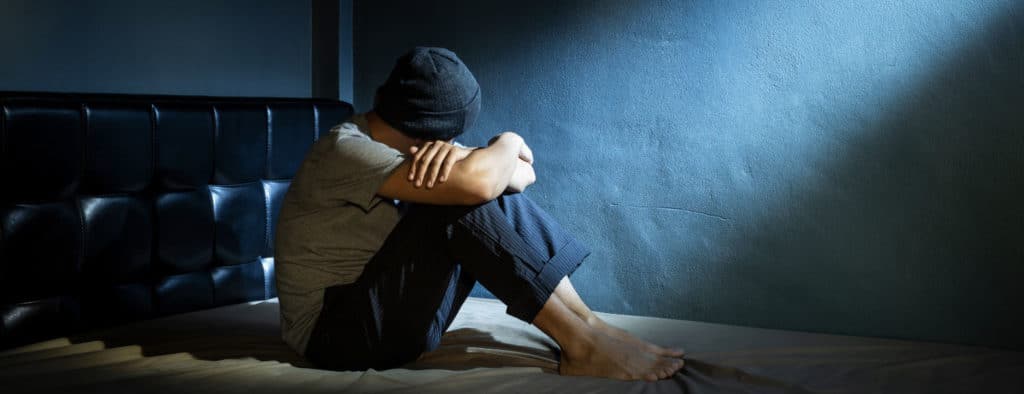8 Common Myths About Psychosis (Debunked)
26th April 2021
Psychosis is an extremely broad term that spans multiple mental health conditions. It can be both a symptom and its own singular condition. And so, making a recovery from psychosis is going to largely depend on how your particular type of psychosis is presenting.
It’s entirely possible for you to experience a short-term psychotic episode that lasts only a few hours or even a few days. These will can – and often do – resolve themselves naturally without the need for intervention.
But in the case of ongoing psychosis, there’s the need for a more thorough approach through understanding your condition, how it relates to you and your lifestyle, what it’s preventing you from doing in your daily life, having a reliable support network and creating an effective form of treatment and self-management strategies.
Your Psychosis Recovery is Wholly Unique to Your Circumstances
The key thing to remember about recovery, in general, is that it’s a process, not an event. It cannot be rushed past your body and mind’s capacity to heal. You have to go at the pace you’re capable of relating to your unique circumstances.
And so, the recovery process will vary from person to person in terms of the duration, depending on the need for what functional improvements to be relearnt. This is very much an integrative process. Some people may be able to recover from their psychosis sooner and return to their daily responsibilities, while others may need a lot longer to achieve the same outcome.
What Mental Disorders Have Psychosis?
- Schizophrenia
- Bipolar
- Schizoaffective disorder
- Drug-induced psychosis
- Depression with psychotic symptoms
- Postpartum psychosis
- Delusional disorder
- Brief psychotic episode
Psychosis Recovery Timeline
Recovery from an initial episode of psychosis usually takes several months. However, if some of the symptoms return, or remain, the recovery process may be extended. It’s not uncommon for some individuals to experience difficulties for months or even several years before they begin to regulate their symptoms and return to everyday activities.
Some common experiences during recovery from psychosis include:
- Impatience: Feeling as though recovery is almost non-existent.
- Depression: Brought on by the symptoms and feelings of isolation
- Social Anxiety: Caused by the hallucination, delusions and cognitive impairment
- Low Self Esteem: Experiencing a loss of self-worth due to the lack of control
- Difficulty Accepting Your Illness: This can make the recovery process much slower
- Trouble Accepting Support: This can be due to the otherworldly perceptions/visions
Understanding Symptoms of Your Psychosis
The symptoms of psychosis are grouped into three main categories.
Hallucinations
Hallucinations occur when you hear, smell, taste or feel things other people can’t and include:
- Hearing voices or sounds others can’t
- Seeing things that other people can’t
- Tasting flavours when you haven’t eaten anything
- Feeling someone when there’s no one there
- Smelling things other people can’t
It’s possible you might hear voices oftentimes only for a few minutes, once a month. Or, the intensity and frequency might be that you hear them every day for hours.
Delusions
Delusions are defined as unorthodox beliefs that others in your community are averse to or can’t comprehend, even though they present as very real to you.
For example, you may feel as though:
- You’re being followed by secret agents or members of the public
- You’re fearful that people are trying to kill you – either strangers or those your know
- You feel as though a chip has been implanted in your brain to monitor your thoughts
- Your food or water supply has been poisoned
- You may also feel/think you’re God – referred to as delusions of grandeur
It’s not always the case that delusions or beliefs cause distress or dysregulation, although it is a common response. You may find you’re able to carry out your daily functions despite your symptoms.
Cognitive Impairments
Cognitive impairments relate to your ability to process your experiences on a mental level. So, learning, remembering and basic functioning all fall under this bracket.
The most common cognitive impairments within psychosis include:
- Concentration problems
- Memory problems
- Processing time and difficulty understanding new concepts
- Difficulty making decisions and being indecisive
Psychosis Recovery and the Brain
Psychotic disorders such as psychosis are often documented as worsening progressively over time. With each psychotic episode, the brain deteriorates.
However, a study led by Dr. Lena Palaniyappan, a psychiatry professor and scientist at Robarts Research Institute, found brain tissue actually increases in certain areas in patients with psychosis even before receiving treatment.
This points to the brain’s natural ability to repair itself through neuroplasticity.
Brain Biology and Psychosis: A Brief Overview
One of the key neurotransmitters that affect psychosis is dopamine. And while there are other factors at play, it’s dopamine that plays the most pivot role in the primary perceptual aberrations, delusions and negative symptoms.
Serotonin does also play a role in psychosis. However, this is often associated with psychosis-related depression.
brain areas affected by psychosis
Recent developments in technology, using modern imaging techniques such as emission tomography, single positron emission tomography, and magnetic resonance imaging have made it possible to pinpoint areas of the brain associated with psychosis.
It’s been observed that cognitive dysfunctions are associated with the hypodopaminergic function of the dorsolateral prefrontal cortex (DLPFC). And symptoms such as depression as linked to the medial prefrontal cortex (MPFC), the anterior cingulate cortex (ACC), and the orbitofrontal cortex.
Can You Make a Full Recovery from Psychosis?
The short answer is yes. Like many other mental health conditions, it is entirely possible to lead a completely functional life after psychosis. Psychosis is treatable. Many people recover from a first psychotic episode and never experience another.
Determining the Best Treatment for Your Psychosis
Treatment for psychosis will always depend on the intensity and frequency of how your psychosis presents. Before any treatment plan can be offered, there needs to be an assessment by qualified mental health professionals. This group can and often does include psychiatrists, psychologists, psychiatric nurses, occupational therapists and social workers.
As part of the evaluation, they’ll be a comprehensive interview to help the mental health professionals supporting you better understand your experience of psychosis. During this time, they’ll also be an opportunity for them to meet your family members and anyone else that’s part of your support group.
Your assessment may then progress to other tests such as brain scans if deemed necessary by your psychiatrist to rule out any underlying physical causes. Neurocognitive examinations may also be recommended. These will test areas such as memory, attention, reasoning, problem-solving, and processing time. This can help determine cognitive changes after a first psychotic episode and can often indicate whether you may or may be able to recover your normal functions.
Medication
Medication is usually an essential part of the treatment process of psychosis, as it can help relieve symptoms and create a stabilising effect through regulation. They can also play a significant role in reducing the chances of a further episode taking place.
The class of medications used to treat psychosis are referred to as anti-psychotics and sometimes known as neuroleptics. They come in two categories: typical (first generation) and atypical (second generation) antipsychotics.
Cognitive Behavioural Therapy (CBT)
Cognitive Behavioural Therapy (CBT) is a form of psychodynamic therapy and evidence-based treatment that’s been documented as improving symptoms and functioning in patients experiencing psychosis.
One of the goals of CBT is to improve capacity and functions by negating some of the difficult experiences of hallucinations, delusions, negative symptoms and other intrusive thought patterns.
CBT is a collaborative treatment intended to empower the client by exploring their condition with the help of their therapist. By working in this way, the nature of their psychotic episodes and beliefs surrounding them can be properly understood with the end goal of reducing any associated dysregulation and distress.
Family Intervention
Family intervention in the context of recovering from psychosis is centred on helping you manage relationships that may be strained by the intensity of your symptoms. This will usually be offered to those who are closest to you and who you’re in close contact with. i.e close friends and family.
What kind of support your friends and family receive will depend on the specifics of your particular symptom set and how it affects both yourself and those around you. These could take the form of group family or individual sessions.
Managing Your Own Recovery from Psychosis/FAQS
An unavoidable part of any recovery process is personal accountability. This doesn’t mean you have to do everything by yourself. It simply means there is a role you must play when you’re separated from your therapist or support group.
As with all mental health conditions, people cope in different ways. And what works well for one person may not work for someone else. However, there are some constants, which, if they’re anchored into a consistent self-management routine can provide the foundation for self-regulating some of the associated symptoms of psychosis on your way to recovery.
Some of the most commonly suggested self-soothing and strategies for self-regulation include:
- Speaking with a friend, family member or anyone else who can empathise with your situation.
- Movement-based relaxation techniques such as yoga, chi gung, tai chi
- Breathing exercises designed to help regulate your nervous system
- Meditations that are intended to help still your mind and help you regain control
- Complimentary therapies such as bodywork, massage, reflexology or aromatherapy.
- Maintaining a structured routine in terms of sleeping, eating and drinking enough fluids
- Setting small attainable goals that you know you achieve to celebrate victories every day
- Regular exercise that could be walking, jogging, swimming or cycling
3 Key Self-Management Techniques for Recovery from Psychosis
In terms of managing some of the more acute symptoms directly, you might try some of the techniques listed below to alleviate some of the distress and become more familiar with your patterning.
1. Talking Back to the Voices
If part of your psychosis involves hallucinations, rather than being the passive observer of them, you could try to take back control of the narrative in your head by opening a dialogue with them. It might be difficult at first. And it may feel uncomfortable.
But the key point to remember is this is your mental headspace. And you have every right to respond to something that’s trying to enter your field of awareness.
If for example, you feel some of the voices you hear are distressed, you could try responding to their needs. It could be that you’re talking to a traumatised part of yourself that requires regulation.
2. Keep a Journal
In addition to talking back to the voices, you could and most definitely should keep a journal of your interactions. This will serve as a viable resource in managing your recovery as well as lessen the chance of future psychotic episodes.
The more you’re able to journal on your experiences, the more information you gather about your experiences, the more you’ll be able to recognise patterns in your hallucinations and dialogues with the voices in your head.
This will help you greatly in feeling as though you have a sense of control. As once you know what your patterns are, they then become predictable. And if you can predict the patterning of your particular psychosis, the distress you have will begin to lessen as a result.
You could ask yourself some of the following questions:
- How many separate voices are trying to speak to you?
- How often do they try and communicate with you?
- Do you find the voices talking to each other?
- What do these voices say most often? What are their patterns?
- What does it make you feel to hear these voices physically, mentally, emotionally and spiritually?
- Are some of the voices worse than others?
- When and where do these voices try and communicate with you the most?
3. Distract yourself
If you find it too hard at any moment to stay with the process of documenting the experience of your psychosis, it’s completely fine to want to disconnect and shut it down. The symptoms of psychosis can be overwhelming for some people due to their intensity.
And so, in those times where you feel like you’re being overwhelmed, you might want to listen to music, a podcast, an audiobook, watch a YouTube video, a movie or a TV series. Anything that has a strong auditory element that can drown out the noise of the voice will be effective.
You could also try combining this with small tasks and chores such as cleaning the house, tidying your room, doing the dishes. Or, any other kind of repetitive task you can turn into a quasi-meditative practice. This will help you anchor further into your body.













